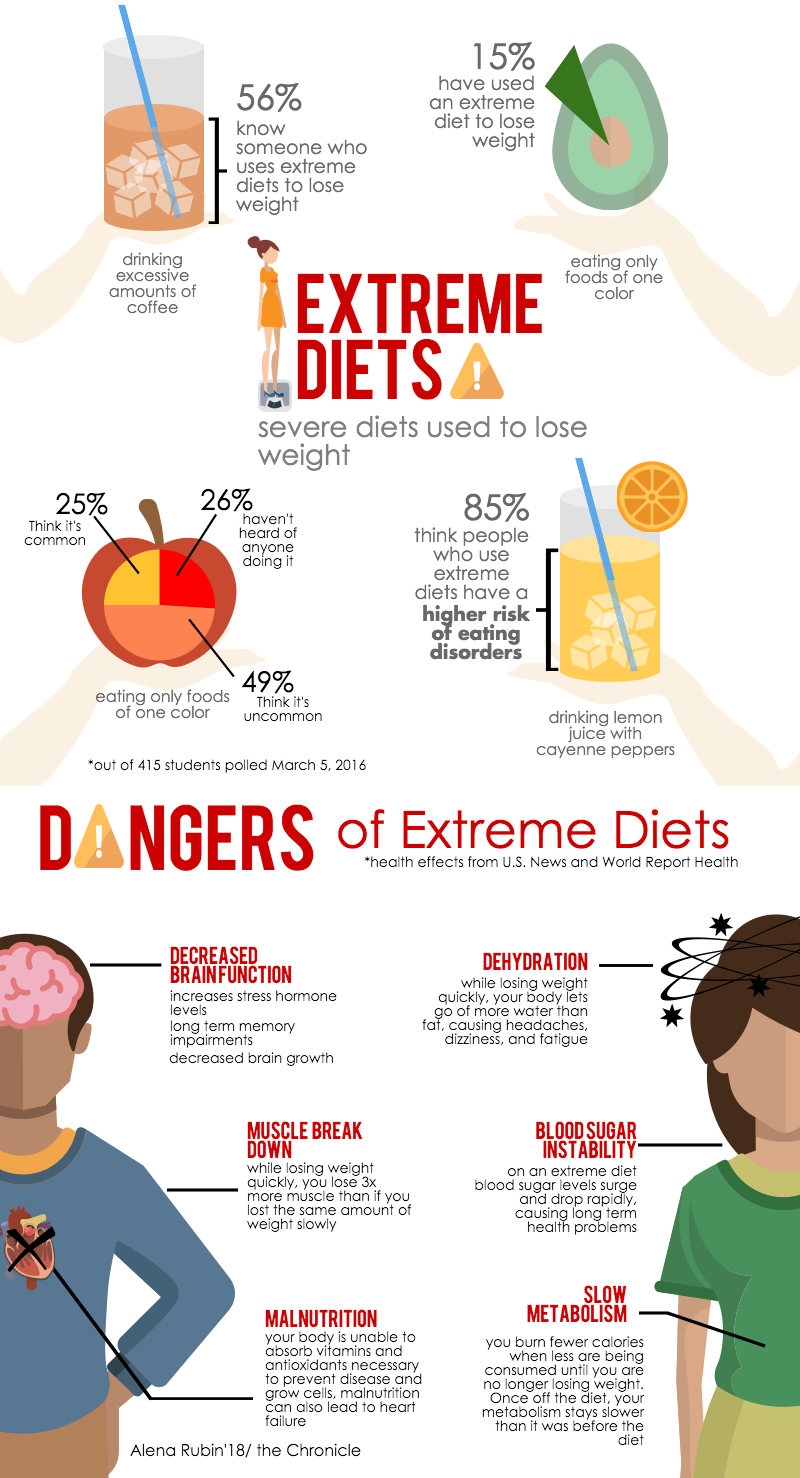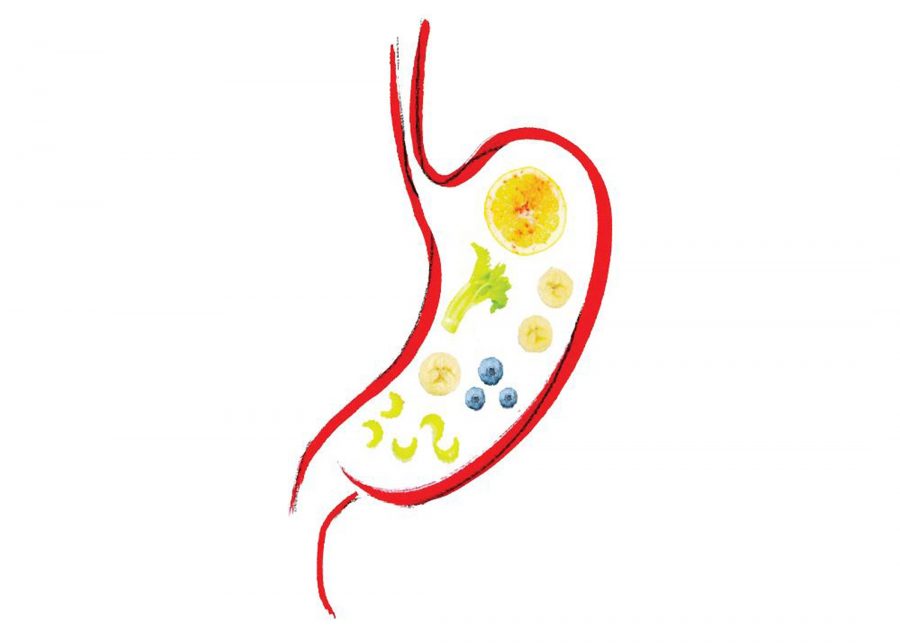A junior at a Los Angeles area high school, Zaria* remembers how her mother used to measure her waist and compare it to her own.
“If we were close, she would be really excited,” Zaria said. “I thought it was like a competition.”
For Zaria, dieting and body consciousness are very familiar concepts.
“My family works in the film industry, which is very oriented around weight loss,” Zaria said. “A lot of our family friends are concentrated on that. I grew up around it.”
As she got older, Zaria began to notice the extreme diets her parents used to lose weight.
“My dad did the Angelina Jolie [diet], where you put cayenne pepper in lemon juice and you only drink that for a week,” said Zaria, who added that she thinks the environment she grew up in contributed to her eating disorder.
Extreme diets are characteristic of eating disorders, but they are also prevalent among teenagers who try to lose weight quickly.
Zaria started to develop pre-Anorexic-type eating habits in sixth grade and later began making herself throw up regularly, which ultimately led to her diagnosis of bulimia nervosa during her freshman year.
“I started doing this weird thing that I sometimes still find myself doing, which was that at the end of the day, I would think about what I ate that day and if it would fit on one plate,” Zaria said. “I also did colors, like one day I’m only going to eat stuff that’s red or yellow or blue.”
While some use dieting guidelines they find online, others like Zaria and Gertrude* ’17 come up with their own diets, often not knowing that their habits are similar to those associated with disordered eating.
Gertrude, who at first just tried to eat healthier and exercise to lose weight, said she never admitted to herself that she might have an eating disorder.
“I was very in denial,” Gertrude said. “I did my own version of an extreme diet, but I didn’t really follow anything. I would have very restricted portions, and then at night I would have to sleep on my stomach because I would go to bed and still be hungry. It was a lot of suppressing hunger.”
Pressure to be thin can come from a number of sources that include an internal need for control and outside influences like friends or unrealistic body expectations promoted in the media, said Michelle Carlson, executive director at the national hotline Teen Line.
“It’s just important to do everything in moderation,” Carlson said. “Especially if you’re a teen and you’re already at a healthy weight, extreme dieting can be very dangerous and sometimes even leads to eating disorders.”
Talking about extreme diets can often be harmful for those like Christine* ’17 who are in recovery for their eating disorder.
“I honestly don’t know how I even made it this far in my recovery with the amount of diet talk I hear around me,” Christine said. “Despite almost killing me, [my eating disorder] was above all a coping mechanism and an addiction, and seeing fad diets promoted left and right brings back a nostalgia for that addicting, but false sense of safety.”
With discussions about extreme diets, it is important for people to be aware of their surroundings and realize how their words can affect others, Carlson said.
“We wouldn’t talk about how much we drank if we knew someone is an alcoholic, and we don’t make jokes about sexual assault,” Carlson said. “So why do we continue to casually mention our diets, our weight and other potentially triggering things?”
When Christine was struggling with her eating disorder, she would frequent online forums that discussed weight loss diets.
“I tried all of them, every single one I could get my hands on in a desperate attempt to lose weight,” Christine said. “It only led to me feeling really undernourished, uncontrollably binging as a result, and trying to find a way to purge.”
She specifically remembers reading that mono diets, where people only eat one type of food for several days, and the 2-4-6-8 diet, where in five-day cycles, people eat 200, 400, 600, 800 calories per day and then fast, were the most popular.
Some teenagers like ballerina Cyra ’16 and runner Casey Crosson ’17 are encouraged to adopt restrictive diets to improve their athletic performance.
When Crosson’s cross country coach suggested a diet for his runners that focused on minimizing chemicals and refined sugars, she jumped on board and wound up continuing the diet even after the season was over.
“It was really a ‘you don’t have to do this, but it would be good for you if you did,’ ” Crosson said. “It actually encouraged us to eat more—our coach encouraged us to eat five times a day—so I was never hungry once. It was more that I felt better. I felt healthier, just because I wasn’t eating lots of Cheetos.”
Cyra’s diet for ballet is similar. It consists mainly of avoiding desserts and processed carbohydrates found in foods like bread and pasta, and while her studio does not track or enforce her diet, she does feel pressure to be thin for her sport.
“Especially before a show or competition, [my teachers are] like ‘you need to fit in your costume,’ ” Cyra said. “It’s just always that you can be thinner, which is really annoying, and it’s especially hard because not everyone has a thin body type. It’s kind of sad that when you’re in ballet, you’re looked down upon if you’re not skinny.”
While Cyra has never done anything unhealthy or taken her diet to an extreme, she knows people who have.
“A lot of people just drink a ton of water, and this girl that I knew, she would drink a ton of coffee because it would make you go to the bathroom,” Cyra said. “A lot of people, I realized, do Adderall because it’s also an appetite suppressant.”
However, there are also checks in place to ensure that dancers get help once the teachers notice that they seem unhealthy or unnaturally thin.
“At my studio right now, nobody has an eating disorder, and at most of the summer programs I’ve gone to, they haven’t either because it’s a big liability,” Cyra said. “Usually if you’re unnaturally skinny, they will send you home.”
Ultimately, it is important to recognize that it can be incredibly dangerous for teenagers to adopt risky diets, Carlson said.
For Zaria, looking back on her years of disordered eating fills her with regret.
“It makes me just really annoyed because there are so many other things you could be focusing on right now,” Zaria said. “And it is kind of sad, too, because most of the time, you don’t look bad. Also, nobody’s perfect, so it doesn’t even matter.”
*Names have been changed.



































